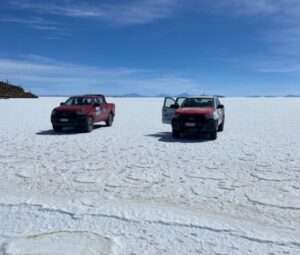Vehicles on expedition to the Chilean and Bolivian mountains used UCO

This ground breaking expedition was organised to evaluate the premise that remote expeditions over the severest terrain and environmental conditions can be carried out using sustainable and carbon saving fuel sources – primarily waste cooking oil - to power vehicles.
Solar was used power the equipment. The information thus gained will be applied for application in urban mass transit and heavy industry operations such as mining in Chile and Bolivia.
The expedition left from Santiago, Chile in late April and traversed the high arid passes of the Andes at the borderlands of Chile and Bolivia before exploring the largest salt pan in the world, The Salar de Uyuni in Bolivia, and returning through the central Atacama desert – the driest place on Earth.
The two unmodified expedition trucks (Ford Ranger pickups) were run using a biofuel/diesel mix of up to 20% to keep within manufacturer’s warranty stipulation.
The waste cooking oil was collected from restaurants in Santiago and processed for use.
In Bolivia a nationally available 20% biodiesel mixed was used. Initially, by running a control vehicle on 100% diesel we were able to qualitatively asses and compare the functioning and performance of both trucks at high altitude (up to 5000 m (16,400 ft) and through a temperature range of -15°C to +30°C. In addition, the trucks were assessed over extreme off-road conditions where low-range gearing and high revs were necessarily employed to traverse deep sand/ash and steep inclines.
There was no discernible difference in engine performance between the control and active vehicles in all the environmental parameters listed above.
The expedition is supporting the UK charity: Action for Stammering Children (Patron, Sir Michael Palin) that seeks to help kids and teenagers with severe stammers.














